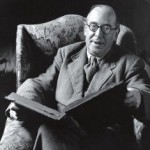 Much as I enjoyed the Narnia books as a child, I’ve never got the whole C.S. Lewis thing and I don’t intend to start trying now. Writing in the New York Times Mark Oppenheimer looks at the Lewis phenomenon and, reasonably enough, quotes one of Lewis’ more well-known arguments for the divinity of Christ:
Much as I enjoyed the Narnia books as a child, I’ve never got the whole C.S. Lewis thing and I don’t intend to start trying now. Writing in the New York Times Mark Oppenheimer looks at the Lewis phenomenon and, reasonably enough, quotes one of Lewis’ more well-known arguments for the divinity of Christ:
In “Mere Christianity,” Lewis writes of Jesus: “I am trying here to prevent anyone saying the really foolish thing that people often say about Him: ‘I’m ready to accept Jesus as a great moral teacher, but I don’t accept His claim to be God.’ That is the one thing we must not say. A man who was merely a man and said the sort of things Jesus said would not be a great moral teacher. He would either be a lunatic — on a level with the man who says he is a poached egg — or else he would be the Devil of Hell.”
Mr. Oppenheimer notes this:
This famous passage does not, on a second read, make much sense. After all, could not a great moral teacher have messianic delusions? But on a first read, it is quite persuasive, and classic Lewis. It is clear, confident and a bit humorous, and it offers a stark choice as it firmly suggests the right answer.
Fair enough, but it has always struck me (and I’m sure I’m not the first to think so) that Lewis’ argument (at least the extract quoted here) also sidesteps the rather important question as to whether the writers of the Gospels offer an accurate account of what it was that Jesus may have actually said. Was the claim to divinity His or theirs?
No way of telling, I suppose.

Apologist William Lane Craig, for one, has seen the fault here and amended Lewis’s line from “Lunatic, Liar, Lord?” to add “Legend.”
Lewis has another such clever argument regarding the Gospels (that also happens to address your questions):
But of course when you weigh a set of improbables, it takes a whole lot of improbable to beat “divinity.”
*That C.S. Lewis quote is from here, page 155.
“Or else, some unknown writer in the second century, without known predecessors or successors, suddenly anticipated the whole technique of modern, novelistic, realistic narrative.”
Really C.S. Lewis? The Iliad and Odyssey don’t count?
Lewis is often a joy to read. In the passage quoted above, however, he was engaged in advocacy, not reasoning–and, I suspect, at some level he knew it.
Really C.S. Lewis? The Iliad and Odyssey don’t count?
Johh, no, the Iliad and the Odyssey most certainly do not count as “modern, novelistic, realistic narrative” – they are grand, soaring, epic poems. But they bear little relationship to the earthy, spare prose we find in the Gospels.
I’m no Old Testament scholar, but according to my recollection, it too possesses a strong narrative line, exposition, description, action, dialogue, and some fairly well-developed characters, all of which are characteristic of the novel. So apparently the literary technique existed B.C.
And yes, all of those devices we think of today as novelistic appear in the Iliad and the Odyssey and other epic poetry.
“at least the extract quoted here” is the key phrase – Lewis is discussing whether the recorded teachings of Jesus can be separated from the recorded claims to divinity of Jesus. Accuracy of the record is a long argument of its own.
I think the problem here, for Lewis as well as most Christians, is that in their mind they harmonize that which could not be reconciled. And so the Christian Fathers made sophisticated arguments why seeming contradictions were not contradictions after all.
Truth be told, we have four quite different stories told for different groups at different times for different purposes.
Didn’t one of the Greek philosophers come up with the Golden Rule first anyway? Perhaps the one we should be revering as a moral teacher is Socrates.